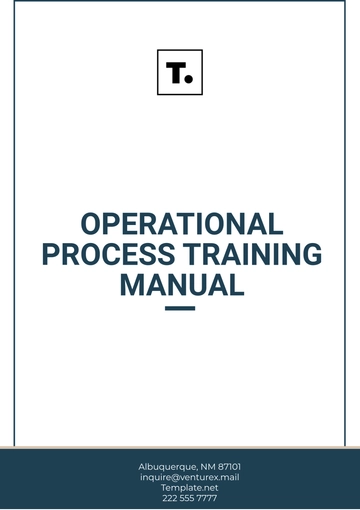Free Legal Case Management Training Manual

1. Introduction to Legal Case Management
Legal case management is the systematic process of overseeing and administering legal cases from inception to resolution. It plays a crucial role in ensuring the smooth operation of law firms and legal departments by organizing and coordinating various tasks and activities related to legal matters. The purpose of this training manual is to provide comprehensive guidance on the fundamentals of legal case management, equipping case managers and legal professionals with the necessary knowledge and skills to effectively manage cases within [Your Company Name].
2. Fundamentals of Legal Case Management
Legal case management involves managing cases through various stages, from initial intake to final resolution. Understanding the stages of a legal case is essential for effective case management. These stages typically include:
Stages | Details |
|---|---|
Case Intake | This stage involves the initial contact with a potential client, gathering information about the case, and determining whether the firm or legal department can take on the case. |
Investigation and Assessment | Once a case is accepted, thorough investigation and assessment are conducted to gather evidence, assess the merits of the case, and develop a strategy. |
Pretrial Procedures | This stage involves preparing pleadings, motions, and other documents, as well as conducting discovery and negotiations with opposing parties. |
Trail | If the case proceeds to trial, case managers assist attorneys in preparing for trial, managing exhibits and witnesses, and ensuring all necessary documents and evidence are in order. |
Post-Trial Procedures | After the trial concludes, case managers assist in drafting post-trial motions, handling appeals, and executing judgments or settlements. |
Roles and responsibilities in legal case management may vary depending on the size and structure of the organization. Case managers typically work closely with attorneys, support staff, and clients to ensure cases progress smoothly and efficiently.
3. Case Intake and Assessment
The first step in legal case management is case intake and assessment. This involves gathering information from potential clients and determining whether the firm or legal department can take on the case. Key procedures in case intake and assessment include:
Client Intake: When a potential client contacts the firm or legal department, case managers conduct an initial consultation to gather information about the case, including the nature of the legal issue, the parties involved, and any relevant documents or evidence.
Conflict Checks: Case managers perform conflict checks to ensure there are no conflicts of interest that would prevent the firm from representing the client. This involves checking existing client records and consulting with attorneys to identify any potential conflicts.
Client Screening: Case managers assess the potential client's ability to pay for legal services, their expectations for the case, and any other relevant factors to determine whether the firm is a good fit for the client's needs.
Case Assessment: Once a case is accepted, case managers work with attorneys to conduct a thorough assessment of the case, including evaluating the strength of the legal claims, identifying potential risks and challenges, and developing a strategy for moving forward.
Scenario: |
|---|
A client contacts [Your Company Name] seeking representation in a personal injury case. The case manager conducts an initial consultation with the client to gather details about the accident, injuries sustained, and potential liability. The case manager then performs conflict checks to ensure there are no conflicts of interest that would prevent the firm from representing the client. After confirming that the firm can take on the case, the case manager collaborates with attorneys to assess the merits of the case and develop a strategy for pursuing compensation on behalf of the client. |
4. Case Planning and Strategy Development
Once a case is accepted, case planning and strategy development are critical components of effective legal case management. This involves setting objectives and goals for the case, developing a case management plan, and allocating resources and tasks accordingly. Key steps in case planning and strategy development include:
Steps | Details |
|---|---|
Setting Objectives and Goals | Case managers work with attorneys to establish clear objectives and goals for the case, taking into account the client's interests, legal requirements, and desired outcomes. |
Developing a Case Management Plan | A case management plan outlines the steps and tasks necessary to achieve the objectives of the case. This may include timelines, deadlines, and milestones for key activities such as discovery, motion practice, and trial preparation. |
Allocating Resources | Case managers identify the resources needed to support the case, including personnel, technology, and external services such as expert witnesses or investigators. They ensure resources are allocated effectively to meet the needs of the case within budgetary constraints. |
Assigning Tasks | Case managers assign tasks to attorneys, support staff, and other team members based on their skills, expertise, and availability. They track task assignments and deadlines to ensure timely completion and accountability. |
For example, in a complex commercial litigation case, case managers collaborate with attorneys to develop a case management plan that includes deadlines for document discovery, depositions, and motion practice. They allocate resources such as paralegal support and document management software to facilitate the efficient handling of case-related tasks. Tasks are assigned to attorneys and support staff based on their areas of expertise and availability, with regular monitoring to track progress and address any issues that arise.
5. Documentation and Recordkeeping
Documentation and recordkeeping are essential aspects of legal case management, ensuring that all case-related information is accurately recorded, organized, and accessible when needed. This includes maintaining detailed records of client communications, case developments, and key documents such as pleadings, motions, and evidence. Key considerations in documentation and recordkeeping include:
Thorough Documentation: Case managers ensure that all communications with clients, opposing parties, and other stakeholders are documented in writing, including phone calls, emails, and meetings. They maintain detailed notes and records of case-related activities, decisions, and outcomes.
Organizing Case Files: Case managers organize case files in a logical and systematic manner to facilitate easy retrieval and reference. This may involve creating folders or binders for different aspects of the case, such as pleadings, discovery materials, and correspondence.
Maintaining Confidentiality: Case managers take steps to protect the confidentiality of sensitive information contained in case files, including personal and financial information about clients, privileged communications with attorneys, and proprietary business information. They ensure that access to case files is restricted to authorized personnel and that appropriate security measures are in place to prevent unauthorized disclosure.
Recordkeeping Best Practices: Case managers adhere to recordkeeping best practices and standards, including maintaining backups of electronic records, labeling and indexing physical files for easy identification, and implementing policies and procedures for document retention and destruction in accordance with legal and regulatory requirements.
Scenario: |
|---|
A family law case involving divorce proceedings, case managers maintain detailed records of communications with the client regarding custody arrangements, property division, and financial disclosures. They organize case files into separate folders for each aspect of the case, including pleadings, discovery responses, and correspondence with opposing counsel. Strict confidentiality protocols are followed to protect sensitive information, such as financial records and child custody evaluations, from unauthorized access. |
6. Communication and Client Management
Effective communication and client management are essential skills for case managers, ensuring that clients are kept informed about the progress of their cases and their concerns are addressed in a timely and professional manner. Key considerations in communication and client management include:
Considerations | Details |
|---|---|
Clear and Timely Communication | Case managers communicate regularly with clients to provide updates on case developments, answer questions, and address concerns. They ensure that clients understand their rights, responsibilities, and options for resolving their legal issues. |
Managing Client Expectations | Case managers set realistic expectations for clients regarding the likely outcomes of their cases, potential costs and fees, and the timeframes involved. They educate clients about the legal process and the factors that may impact the outcome of their cases, such as evidence, court rulings, and opposing party tactics. |
Handling Difficult Clients | Case managers are trained to handle difficult clients with professionalism and empathy, de-escalating conflicts and addressing grievances in a constructive manner. They listen actively to clients' concerns, validate their feelings, and work collaboratively to find solutions that meet their needs and objectives. |
Resolving Client Complaints | Case managers have procedures in place for handling client complaints and grievances, including escalating issues to senior management or the firm's grievance committee if necessary. They document complaints thoroughly and follow up with clients to ensure that their concerns are addressed satisfactorily. |
In a criminal defense case, case managers maintain open lines of communication with the client regarding court dates, plea offers, and case strategy. They provide regular updates on the status of the case and promptly respond to any questions or concerns raised by the client. If the client expresses dissatisfaction with the legal representation or the progress of the case, the case manager listens attentively to their concerns and works with the attorney to address them effectively.
7. Case Progress Monitoring and Reporting
Monitoring case progress and generating reports are essential aspects of legal case management, providing attorneys, clients, and other stakeholders with timely and accurate information about the status of their cases. Key considerations in case progress monitoring and reporting include:
Tracking Case Milestones: Case managers monitor case milestones, deadlines, and court dates to ensure that key activities are completed on time and in accordance with legal requirements. They use case management software or other tracking tools to manage deadlines and send reminders to attorneys and support staff.
Monitoring Case Expenses: Case managers track case-related expenses, including attorney fees, court costs, and expert witness fees, to ensure that they stay within budgetary limits. They review invoices and expense reports for accuracy and compliance with client billing guidelines.
Generating Reports: Case managers generate reports for internal and external stakeholders, including attorneys, clients, and firm management. These reports may include updates on case status, upcoming deadlines, expenses incurred, and anticipated next steps. Reports are customized to meet the specific needs and preferences of each stakeholder.
Communicating with Stakeholders: Case managers communicate regularly with attorneys, clients, and other stakeholders to provide updates on case progress and address any issues or concerns that arise. They ensure that stakeholders are kept informed about significant developments and are involved in key decision-making processes.
In a complex commercial litigation case, case managers use case management software to track key milestones such as discovery deadlines, motion filing dates, and trial dates. They generate weekly status reports for the client, summarizing recent case developments, upcoming deadlines, and expenses incurred. They also communicate regularly with the client's in-house counsel and outside counsel to coordinate case strategy and address any concerns or questions that arise.
8. Case Resolution and Closure
At the conclusion of a legal case, case managers play a critical role in facilitating case resolution and closure, ensuring that all necessary tasks and activities are completed and that the client's objectives are achieved. Key considerations in case resolution and closure include:
Considerations | Details |
|---|---|
Implementing Case Strategy | Case managers work closely with attorneys to execute the case strategy developed during the planning stage, including preparing pleadings, conducting discovery, and presenting evidence at trial. |
Negotiating Settlements | Case managers assist attorneys in negotiating settlements with opposing parties, reviewing settlement offers, and advising clients on the potential risks and benefits of accepting or rejecting a settlement. |
Finalizing Judgments | If the case proceeds to trial and a judgment is issued, case managers ensure that all necessary post-trial procedures are completed, such as filing post-trial motions, executing judgments, and enforcing court orders. |
Closing Out Cases | Once the case is resolved, case managers oversee the process of closing out the case, including archiving case files, closing client accounts, and preparing final billing statements. |
Conducting Post-Case Reviews | After the case is closed, case managers conduct post-case reviews to evaluate the effectiveness of case management strategies and identify lessons learned for future cases. |
For example, in a medical malpractice case, case managers assist the attorney in preparing for trial by organizing exhibits, coordinating witness testimony, and preparing trial exhibits. After a favorable verdict is obtained, case managers work with the attorney to finalize the judgment and ensure that all post-trial procedures are completed. They then close out the case by archiving case files and preparing final billing statements for the client.
9. Technology and Tools in Case Management
Technology and tools play an increasingly important role in legal case management, enabling case managers to streamline processes, improve efficiency, and enhance communication and collaboration among team members. Key considerations in technology and tools in case management include:
Case Management Software: Case managers use specialized case management software to organize case files, track deadlines, and manage tasks and workflows. This software may include features such as document management, calendaring, time tracking, and client communication.
Document Automation: Case managers use document automation tools to generate legal documents and forms quickly and accurately, reducing manual errors and saving time.
Communication Platforms: Case managers utilize communication platforms such as email, video conferencing, and secure messaging apps to facilitate communication and collaboration among team members, clients, and external stakeholders.
Legal Research Tools: Case managers leverage legal research tools and databases to conduct legal research, review case law, and stay up-to-date on legal developments relevant to their cases.
Data Analytics: Case managers use data analytics tools to analyze case-related data, identify trends and patterns, and make data-driven decisions about case strategy and resource allocation.
Scenario: |
|---|
In a scenario of a mass tort litigation case, case managers use case management software to track thousands of individual cases and manage voluminous document discovery. They utilize document automation tools to generate standardized pleadings and discovery responses quickly and accurately. They also use data analytics tools to analyze case data and identify common issues or trends across multiple cases. |
10. Compliance and Ethics in Case Management
Compliance with legal and ethical obligations is paramount in legal case management, ensuring that cases are handled in accordance with applicable laws, regulations, and professional standards. Key considerations in compliance and ethics in case management include:
Legal and Ethical Obligations: Case managers are familiar with the legal and ethical obligations that govern their conduct as legal professionals, including rules of professional conduct, client confidentiality rules, and conflict of interest rules.
Avoiding Conflicts of Interest: Case managers take steps to identify and avoid conflicts of interest that may arise in the course of their work, including conflicts between current clients, conflicts between current and former clients, and conflicts with the interests of the firm or its employees.
Maintaining Confidentiality: Case managers maintain strict confidentiality of client information and privileged communications, adhering to client confidentiality rules and privacy laws. They ensure that client files and communications are secure and protected from unauthorized access.
Compliance with Laws and Regulations: Case managers ensure that their actions and decisions comply with all applicable laws, regulations, and court rules governing case management, including rules of civil procedure, evidence rules, and local court rules.
Professional Integrity: Case managers uphold high standards of professional integrity and ethical conduct in their interactions with clients, opposing parties, and other stakeholders. They act with honesty, fairness, and transparency in all aspects of their work.
Case managers adhere to strict confidentiality protocols to protect sensitive information about the client's business operations, financial affairs, and legal strategy. They ensure that privileged communications between attorneys and clients are kept confidential and are not disclosed to third parties without the client's consent. They also avoid conflicts of interest by conducting thorough conflict checks and obtaining informed consent from clients when potential conflicts arise.
11. Continuous Improvement and Professional Development
Continuous improvement and professional development are essential for case managers to stay abreast of changes in the legal profession, enhance their skills and knowledge, and deliver high-quality service to clients. Key considerations in continuous improvement and professional development include:
Considerations | Details |
|---|---|
Ongoing Learning | Case managers engage in ongoing learning and professional development activities to enhance their knowledge of legal principles, procedures, and best practices. This may include attending legal seminars and conferences, participating in online courses and webinars, and reading professional journals and publications. |
Soliciting Feedback | Case managers solicit feedback from clients, attorneys, and other stakeholders to identify areas for improvement and opportunities for growth. They actively seek input on their performance, communication style, and client satisfaction to ensure that they are meeting the needs and expectations of their clients and colleagues. |
Implementing Improvements | Case managers implement improvements based on feedback and lessons learned from previous cases. They identify areas where processes can be streamlined, efficiencies can be gained, and client service can be enhanced, and they take proactive steps to implement changes and monitor their effectiveness. |
Professional Networking | Case managers participate in professional networking events and activities to build relationships with other legal professionals, exchange ideas and information, and stay connected with developments in the legal community. They join professional associations, attend networking events, and participate in online forums and discussion groups to expand their professional network and stay informed about industry trends and opportunities. |
In a personal injury case, case managers actively seek feedback from clients about their experience with the firm, including the quality of legal representation, communication with attorneys, and overall satisfaction with the outcome of the case. They use client feedback to identify areas for improvement in case management processes, such as communication protocols, case updates, and responsiveness to client inquiries. They also participate in legal seminars and webinars on topics such as personal injury law, trial advocacy, and client management to enhance their knowledge and skills in their practice area.
12. Conclusion
In conclusion, effective legal case management is essential for delivering high-quality legal services, achieving successful case outcomes, and maintaining client satisfaction. By following the principles outlined in this training manual, case managers can effectively manage cases within [Your Company Name], ensuring that cases progress smoothly and efficiently from inception to resolution. Continuous learning, professional development, and a commitment to excellence are key to success in the field of legal case management.
- 100% Customizable, free editor
- Access 1 Million+ Templates, photo’s & graphics
- Download or share as a template
- Click and replace photos, graphics, text, backgrounds
- Resize, crop, AI write & more
- Access advanced editor
Introducing the Legal Case Management Training Manual Template by Template.net. Empower your team with this customizable and editable resource for efficient case handling. Utilize our AI Editor Tool to tailor the manual to your firm's specific needs effortlessly. Enhance staff proficiency and streamline workflow processes. Simplify training initiatives with this essential resource. Equip your team for success in legal case management.





























